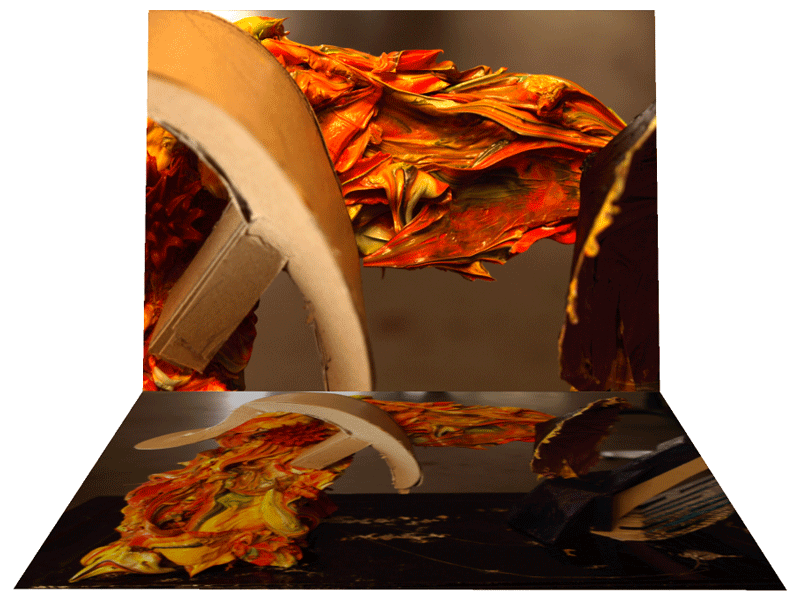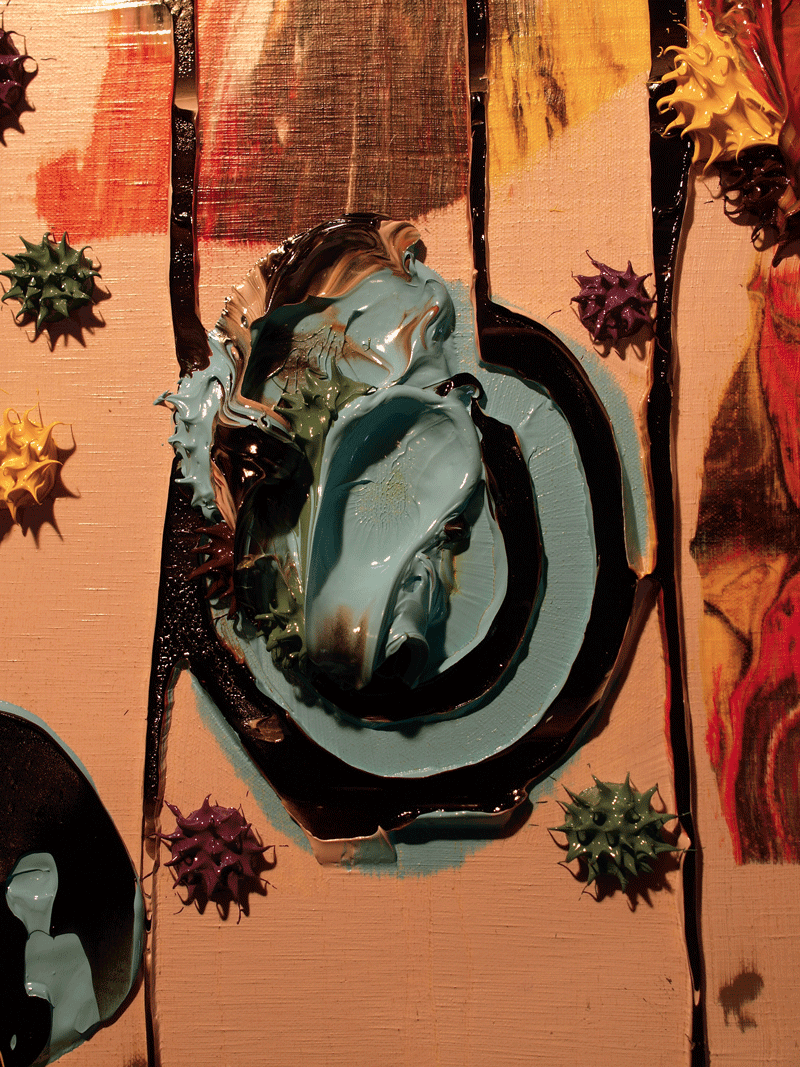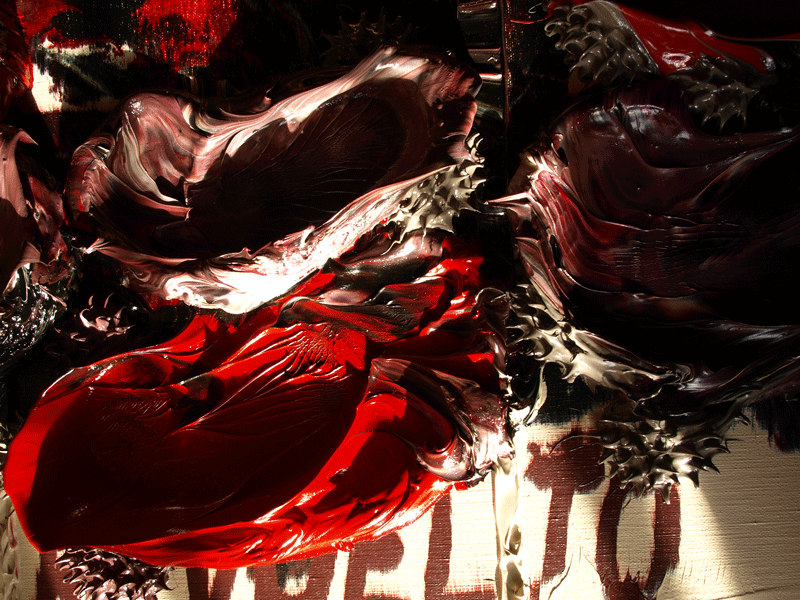May 31, 2010
In Loving Memory...

My father (sitting, second from the right) and company in Korea c.1950.
Details here.
May 30, 2010
Rattlesnake
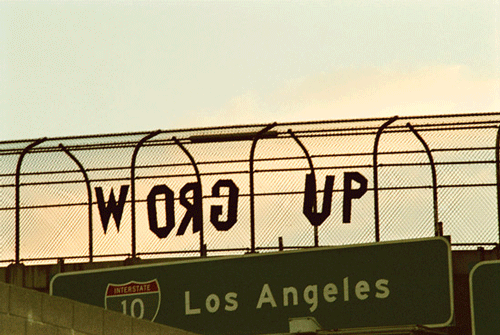
Me: Did you go to the (Culver City) openings?
Friend: No, missed them.
Me: Me too.
Friend: Went to Parker's opening for Joe Deutch though.
Me: How'd that go?
Friend: The artist staged a rattlesnake, got bit and went to the hospital as part of the performance.
Me: No shit.
Friend: Yeah.
Me: Really?
Friend: Yeah.
Me: I thought you were on one of yer flights of fancy.
Friend: No, that's what happened.
Me: (!)
Related links:
Parker Jones Gallery
Domestics Terrorize L.A. Artist.
Image: Deutch's print work at Cirrus (...only because Parker maintains a lean website).
May 27, 2010
May 26, 2010
"I'll be damned."

I just received Bradbury's book, Green Shadows, White Whale, about the writing of the screenplay for John Huston's rendition of Melville's Moby-Dick. It's also about his encounter with Ireland and the Irish, John Huston's home base while he was shooting the movie, written as if he were Ishmael himself. This is chapter 8 in its entirety and early in the story where Huston, like Ahab, seals a kind of supernatural pact with a key member of his crew, his lead harpooneer, the young lad Raymond:
"You know anything about hypnotism, kid?""Some," I said.
"Ever been hypnotized?"
"Once," I said.
We were sitting by the fire after midnight with a bottle of Scotch now half empty between us. I hated Scotch, but since John relished it, I drank.
"Well, you haven't been in the hands of a real pro," said John, languidly sipping at his drink.
"Which means you," I said.
John nodded. "That's it. I'm the best. You want to go under, son? I'll put you there."
"I had my teeth filled that one time, my dentist, a hypnodentist, he-"
"To hell with your teeth, H.G," H.G. was for H.G. Wells, the author of Things to come, The Time Machine, and The Invisible Man. "It's not what comes out in teeth, it's what goes in your head. Swallow your drink and give me your paw."
I swallowed my drink and held out my hands. John grabbed them.
"Okay, H.G., shut your eyes and relax, total relaxation, easy does it, easy, nice and soft and slow and easy," he murmured, as my eyes shut and my head lolled. He kept speaking and I kept listening, nodding my head gently and he talked on, holding my hands and breathing his mellow Scotch in my face and I felt my bones go loose in my flesh and my flesh lounge out under my skin and it was easy and nice and sleepy an at last John said: "Are you under, kid?"
"Way under, John," I whispered.
"That's the way. Good. Fine. Now listen here, H.G., while you're there and relaxed, is there any one message you want to tell me so I can tell yourself? Give instructions, as it were, for self-improvement or behavior tomorrow? Spit it out. Tell me. And I'll instruct you. But easy does it. Well, . . . ?"
I thought. My head swayed. My eyelids were heavy.
"Just one thing," I said.
"And what's that, kid?"
"Tell me-"
"Yes?"
"Instruct me to-"
"What, kid?"
"Write the greatest, most wonderful, finest screenplay in the history of the world."
"I'll be damned."
"Tell me, John, and I'll be happy. . . ," I said, asleep, deep under, waiting.
"Well," said John. He leaned close. his breath was like an aftershave on my cheeks and chin. "Here's what you do, kid."
"Yes?" I said.
"Write the damnedest, finest, most wonderful screenplay ever to be written or seen."
"I will, John." I said.
(Image: The Cheonan. ROKS Cheonan (PCC-772), that is.)
May 20, 2010
Flight of the Intellectuals: the linkfest

Here are a few more links on Paul Berman after the release of his Flight of the Intellectuals (mentioned earlier). I appreciate Berman not only because he identifies the totalitarian tendency that arises even with anti-totalitarians, but reading his work is a great way to get a picture of recent intellectual history and its historical antecedents.
The linkfest continues below the fold:
Joel Whitney interviews Paul Berman in Guernica Magazine, Nazi Sheikhs:
Guernica: So to put scriptures on a naked woman?s body in her film was not incendiary or reckless, in your reading, it was merely direct.Paul Berman: That film is not even one millimeter a violent film. And the purpose of the film is to make the viewer recognize that violence against women is being committed by fanatics in the name of Islam. This should be opposed. And she?s done a brilliant job of opposing that. As a politician, she brought to the Dutch Parliament the issue of honor killings. She proposed to Parliament that the police make records of honor killings, which is the first thing the police department had to do to recognize and solve the problem. She brought about a significant reform. And I?m guessing that quite a few women are alive today as a result of this reform.
Guernica: So she?s not only not responsible for Van Gogh?s death, but she?s saved uncounted lives.
Paul Berman: Yes! And surely she?s making people think. People with backgrounds like her own. Meanwhile we have a bunch of Western journalists running around saying, ?Oh, don?t listen to her. She is the one responsible for bringing the violence.? She?s not. She?s the one making people think for themselves, sometimes more skillfully, sometimes less skillfully. Ramadan is telling people, ?Don?t think. I?ll say all the nice-sounding blather that you want to hear against bigotry, against violence, and on the other side of my mouth I?ll tell you to revere these terrible sheiks and look to them for guidance, and finally I?ll say we can?t even discuss these issues like stoning women in public.? I hope liberal-minded journalists and intellectuals, of which I am one and Ian Buruma is another, will become more alert to these issues and become aware of how easy it is to fall into old patterns that we saw with the Soviet dissidents, and commitment to a kind of solidarity with the people who are persecuted and not their persecutors.
Dwight Garner reviews Flight of the Intellectuals in the New York Times, In Pursuit of Prey, Carrying Philosophy:
Mr. Berman?s book, portions of which first appeared in The New Republic, is a patient overturning of the rocks that, he argues, Mr. Buruma failed to look under. He writes about historical figures Mr. Ramadan professes to admire and notes the tiny degrees of separation that link them to Hitler and the Nazis during World War II. He points out Mr. Ramadan?s ambiguous comments about things like 9/11, the stoning of women in Muslim countries and violence against Jews. Mr. Berman detects a kind of seventh-century barbarism lurking behind Mr. Ramadan?s genial smile. Mr. Berman branches out in his book?s final third to condemn liberal intellectuals (nearly all of them but especially Mr. Buruma and the British historian Timothy Garton Ash) and their house organs, including The New York Review of Books, on another, related, account. He writes that while they have admired Mr. Ramadan, they have been inexplicably critical of Ayaan Hirsi Ali, the Somali-born Dutch intellectual who has become a major critic of Islam and, as a consequence, will probably have a large security detail for the rest of her life. Ms. Hirsi Ali?s critics, who include Mr. Buruma and Mr. Garton Ash, find her personality ?strident? and humorless, he writes, and feel she isn?t as important as she might be because having renounced Islam, she no longer speaks to or is in touch with the Muslim hive mind.
Paul Berman reviews Koestler: The Literary and Political Odyssey of a Twentieth Century Skeptic by Michael Scammell in the New Republic, The Prisoner Intellectuals. There is too much in this review to excerpt easily:
These projects added up to something that Koestler, in his ex-Communist mode, liked to call the ?Deminform??which was a play on the ?Cominform,? or Communist Information Bureau, and, in any case, drew on his experience in the early and middle 1930s as part of Willi M?nzenberg?s Communist propaganda network. Here was a case of fighting fire with fire?of countering the Communist campaign among intellectuals with a liberal campaign among intellectuals, not with propaganda but with true and sincere arguments. An argument for democracy, instead of for communism?which, after a few decades, as we have reason to know today, did make a difference. Reading Scammell?s account, I begin to grow a little indignant about the intellectual scene in our own moment, a couple of generations after the major achievements of the Congress for Cultural Freedom. It is very odd that nothing like the Congress for Cultural Freedom exists in our time. A tremendous intellectual debate is taking place right now across huge portions of the world, with the Islamists on one side and a variety of anti-totalitarian liberals, Muslim and non-Muslim, on the other. But the kinds of liberal congresses and campaigns that Scammell describes have never taken place in our day, not on a grand scale anyway. We have human rights organizations, but we do not have sustained campaigns on behalf of the persecuted liberals in countries where organizations such as the Muslim Brotherhood wield a lot of influence. We do not even have the kinds of congresses or conferences that would allow liberal-minded writers from different countries and speaking different languages to meet each other and discuss their respective experiences and thoughts. Nor do we have any kind of sustained and coordinated effort to translate books and essays from one language to another?not on a truly large scale. On matters such as these, Hook, the old socialists of the American labor movement, Koestler, his comrade Man?s Sperber in France, and their various colleagues of the 1940s were way ahead of us.
Independent journalist Michael J. Totten interviews Paul Berman:
MJT: What's fascinating to me is how some Western intellectuals will praise this guy as a moderate when he is, at best, only half moderate, and yet at the same time they sneer at authentic Arab liberals.Paul Berman: Yes.
MJT: You provided some examples in your book, and I've some experience with this myself. I was in Beirut when the Syrian military was finally thrown out by a million citizens taking to the streets, and the whole thing was dismissed by some people in the West as a right-wing Christian Gucci revolution.
Paul Berman: Yes.
MJT: It was absolutely appalling, and I will never forget it. To this day I get hate mail from these kinds of people when I write about Lebanon.
Paul Berman: It really is something remarkable. I can understand it intellectually, but not emotionally. It comes from some old and very unattractive currents in Western thought that we can see over the course of the 20th century.
Remember, a lot of people despised the Soviet dissidents, too.
MJT: Right. What do you think causes this? I think I have it mostly figured out, but I still feel like I'm missing something.
Paul Berman: Well, I don't have it entirely figured out either. [Laughs.] But I note it. In regard to the Soviet dissidents of the past, at least nowadays there is a consensus of opinion that, yes, the dissidents were correct and we should have listened to them. So why didn't we? When I say "we," I mean the intellectual community as a whole in the Western countries. And it's for a whole set of reasons.
An outright sympathy for communism and the Soviet Union itself was only one of those reasons. This only accounted for one set of people.
There were other people who dismissed the dissidents for what you might call conservative reasons. They wanted to assume the Slavic world was hopelessly steeped in traditions of autocracy and ignorance and habits of obedience and deference -- the traditions of tsarism. They could see very well that communism in the Soviet Union had replicated the whole tsarist system, in a new version. There was a leader at the top whose rule was uncontestable. There were the masses at the bottom who had to proclaim the wisdom of the leader at the top. And a lot of people looked at this and said, yes, this is what the Slavic world is supposed to be. This is the authentic thing. Slavs are inherently inferior to Westerners. They aren't capable of being free people. They aren't capable of thinking for themselves.
So when the dissidents rushed out and told us that the Soviet Union is crushing individual liberty or doing other oppressive things, our response to them was to pat them on the head and say, well, it's nice that you got out, and you are welcome to say, but you're not talking about the real world. The real world is one where Slavs are destined to remain forever victims of oppressive tyrants, and this is because Slavs enjoy being victims, so we're not going to take people like you, the dissidents, all that seriously.
The logic behind that kind of thinking is very appealing, to some people. It pictures a world that is dominated by cultures that we like to regard as authentic -- cultures with unchanging deep qualities that go back thousands of years, and may be rich with cultural jewels, but will never produce anything more progressive and will certainly never embrace the kinds of freedoms and advantages and dynamism that we celebrate in our own culture. So that's one idea.
Then there's another idea that appeals to many people, which is based not on our own feeling of superiority, but on our own inferiority. We look at ourselves in the Western countries and we say that, if we are rich, relatively speaking, as a society, it is because we have plundered our wealth from other people. Our wealth is a sign of our guilt. If we are powerful, compared with the rest of the world, it is because we treat people in other parts of the world in oppressive and morally objectionable ways. Our privileged position in the world is actually a sign of how racist we are and how imperialistic and exploitative we are. All the wonderful successes of our society are actually the signs of how morally inferior we are, and we have much to regret and feel guilty about. So when we look at the world, we should look at it in a spirit of humility and remorse, and we should recognize that other people have been unfairly treated.
We should recognize the superiority of those other people over ourselves. Money-wise, we may be richer. But, morally, the other people are richer. And so, we should despise ourselves, and we should love the other people -- the people who possess qualities so superior to our own as barely to be human. And then, filled with those very peculiar ideas, we set about looking for messianic figures who might express the superior culture of the other people, and might lead the human race to a higher stage of development. And if someone objects to this analysis, we say, oh, we inferior Westerners are incapable of understanding the mysterious thought-patterns of those other people, so who are you to judge?
MJT: I think you have it pretty well worked out.
May 17, 2010
Towards Plurality in Theory

Some might call it Critical Theory, but no one can describe it or is otherwise willing to identify it in concrete terms. Some call it our art world dialogue. Whatever the name, movements in art world ideas has surpassed the stage of singular succession and now ideas and theories and systems of thought come tumbling one after the other so much so that this domain is a m?lange. And as cultural events and thought systems rush us all, a general anxiety and longing tends to grow within us for one or the other to rise up and obliterate the rest. I say that we should let loose of that desire and let them all tumble out as we tumble with them. It only feels bad if we resist it.
We are all Ahab
"As if I were Adam, staggering under the piled centuries since Paradise..." Watching John Huston's Moby-Dick after reading the book so many years ago, after listening to the Librovox recording recently, I can easily shrug off the ancient history of dismissive reviews and the burden of requisite sophistication that contemporary culture producers (artists) are called upon to display. Melville never saw the exhaustion of the sales of his first edition for the forty years that spanned to the end of his life, so let this little YouTube upload and humble blogpost add a tittle to the three or four revivals since his passing.
It was a nice surprise to discover that John Huston made the movie, and more happy surprises followed within the movie with Orson Wells' turn as Father Mapple and the revelation that the screenplay was done by Ray Bradbury (from IMDB trivia: "When John Huston first met Ray Bradbury to discuss writing the screenplay, Bradbury admitted, 'I've never been able to read the damned thing.' Huston simply asked Bradbury to come back the next day to start working and, handing him a copy of the book, said, 'Just go home and read what you can.' " I can see the smile curl at the corner of Huston's mouth as he said that.)
So I found Bradbury's writing to be a wonderful compression of Melville's work, as can be witnessed in this clip, chapter 132, Ahab's moment with Starbuck under the "mild, mild wind, and a mild looking sky". And wonderful too, is Gregory Peck's timing as Ahab momentarily balances the gimbal between angel and demon. Here is the original text via Project Gutenberg:
"What is it, what nameless, inscrutable, unearthly thing is it; what cozening, hidden lord and master, and cruel, remorseless emperor commands me; that against all natural lovings and longings, I so keep pushing, and crowding, and jamming myself on all the time; recklessly making me ready to do what in my own proper, natural heart, I durst not so much as dare? Is Ahab, Ahab? Is it I, God, or who, that lifts this arm? But if the great sun move not of himself; but is as an errand-boy in heaven; nor one single star can revolve, but by some invisible power; how then can this one small heart beat; this one small brain think thoughts; unless God does that beating, does that thinking, does that living, and not I. By heaven, man, we are turned round and round in this world, like yonder windlass, and Fate is the handspike. And all the time, lo! that smiling sky, and this unsounded sea! Look! see yon Albicore! who put it into him to chase and fang that flying-fish? Where do murderers go, man! Who's to doom, when the judge himself is dragged to the bar? But it is a mild, mild wind, and a mild looking sky; and the air smells now, as if it blew from a far-away meadow; they have been making hay somewhere under the slopes of the Andes, Starbuck, and the mowers are sleeping among the new-mown hay. Sleeping? Aye, toil we how we may, we all sleep at last on the field. Sleep? Aye, and rust amid greenness; as last year's scythes flung down, and left in the half-cut swaths?Starbuck!"
"DO YOU SMELL IT LADS, WHAT THE WIND CARRIES?"
Postscript 1: Check out Melville's marginalia
Postscript 2: Check out this, a review of Into the Deep: America, Whaling & the World, a new American Experience documentary by Ric Burns.
Postscript 3: Avast! Check out yonder windlass in the movie clip! Do I spy the fates turning a huge element from Allan McCollum's Over Ten Thousand Individual Works?
1968
Via GoodShit, the story behind the making of Revolution:
Not to be confused with the much longer tape-loop arrangement Revolution 9, Revolution 1 as it is sometimes called (and the later recording but earlier released single, Revolution mk.2) was John?s answer to the growing civil unrest of early 1968. The Summer of Love had made way for the Spring of Revolution, and in March 1968 many thousands gathered to march on the American Embassy in London to protest against the Vietnam war. At the same time, various Leninist, Trotskyist and Maoist groups were pressing on Lennon for moral and financial support. In contrast, John strongly believed that an inner moral revolution was more important than a violent external one, and penned the song as someone under pressure to declare his allegiances ? of which he was still unsure. He famously left the question open by including the line ?you can count me in/out?. By the second recording, the faster Revolution mk.2 (9?13 July 1968), he had apparently made his choice and sang ?count me out? ? to the dismay of several left-wing magazines who reported it as a ?betrayal? and a ?bourgeois cry of fear?.You can count this as an appendix to Notes on Revolution and general thoughts about the Situationists and Guy Debord.After another attack by Keele University student John Hoyland, Lennon wrote a passionate letter to the University explaining ?All I?m saying is I think you should do it by changing people?s heads, and they?re saying we should smash the system. Now the system-smashing scene has been going on forever. What?s it done? The Irish did it, the Russians did it, the French did it and where has it got them? It?s got them nowhere. It?s the same old game. Who?s going to run this smashing up? Who?s going to take over? It?ll be the biggest smashers. They?ll be the ones to take over. I don?t know what the answer is but I think it?s down to people. Until you/we change your/our heads ? there?s no chance.? The ?Hey Jude? single, containing ?Revolution? as a B-side, began its sixteen-week run on the UK charts on September 7th, 1968, claiming the top spot a week later. It sold over 3 million copies in America in its first 2 months of release and eventually sold over 4 million copies, to become the fourth best-selling single of the 1960s.
May 15, 2010
Mas O Menos
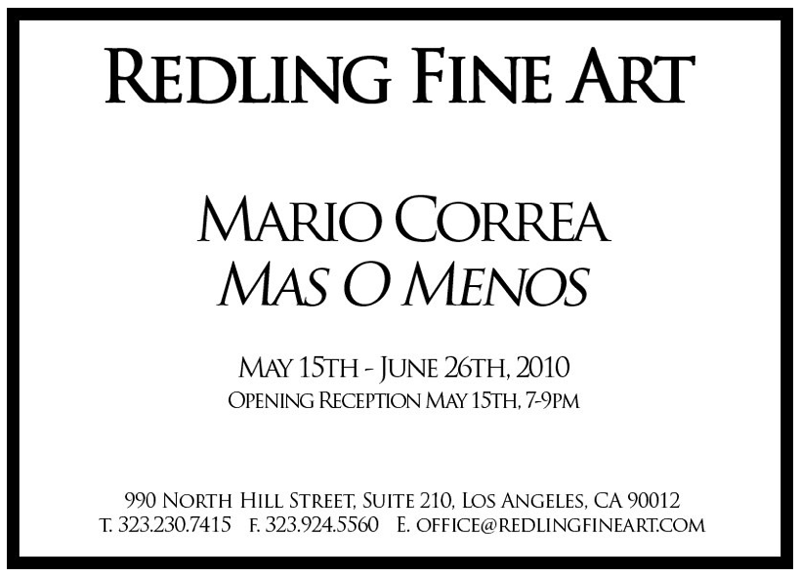
I'm looking forward to seeing Mario's show tonight. I heard that he's laid a floor of plywood and engraving it somehow into a big woodblock print, the products of which are papered onto the wall. I can imagine him inking the floor and laying paper down.
Tilt up construction, more or less.
May 12, 2010
Raking Light
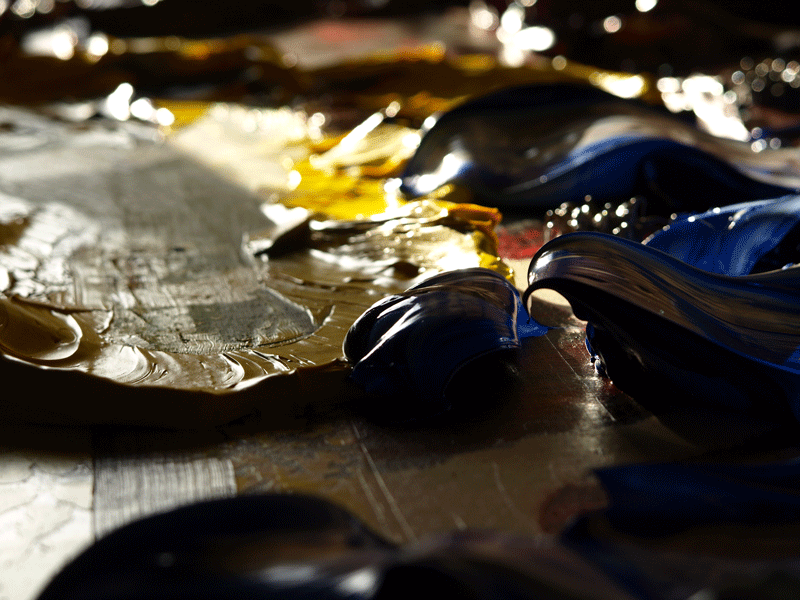
Here are a few detail pics of a recent painting lit by a late afternoon sunset.

Two more after the jump...

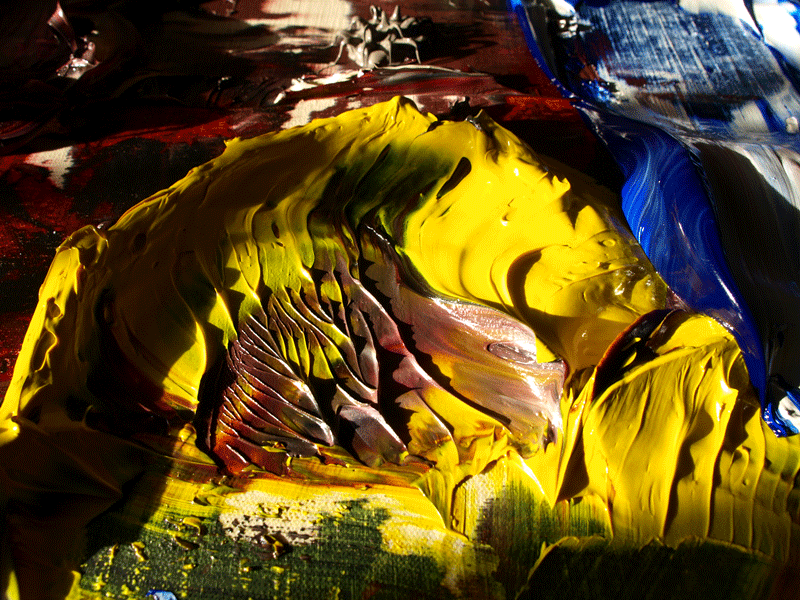
May 7, 2010
Sarcophagus of Alexander
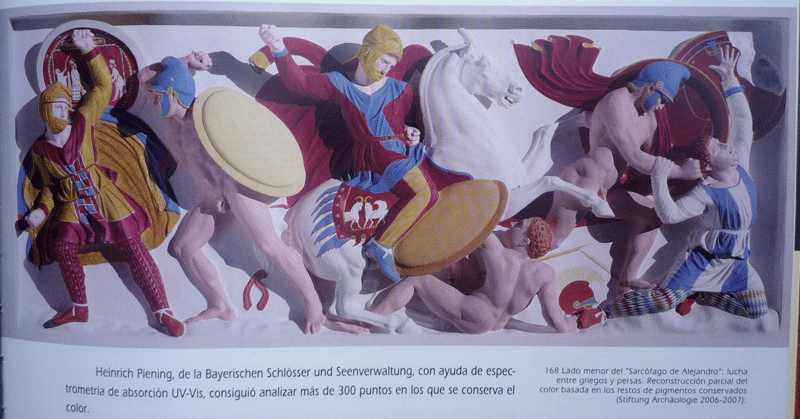
From the catalogue of The Color of the Gods.
Rachael Newbauer at WPA Saturday
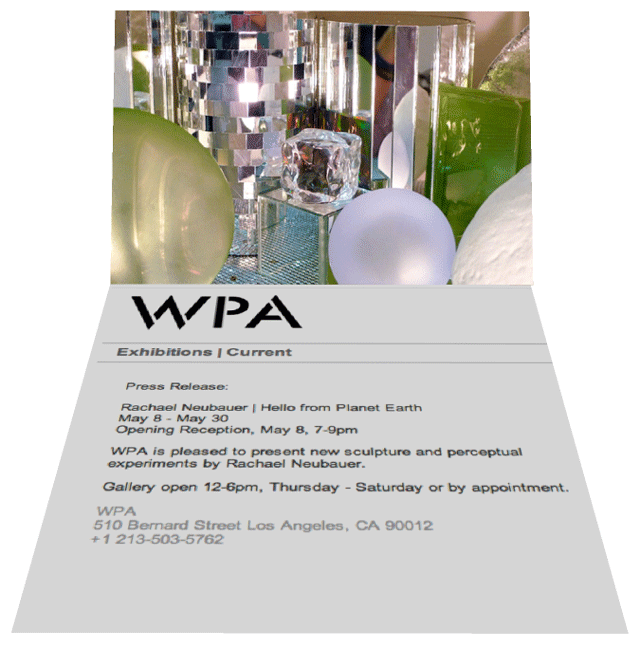
We are watching Rachael setting up her installation at WPA this week, very sparkly, shimmers of light and reflection, lenses, crystals, rays, mirages.
This Saturday should be interesting, with Bart Exposito opening at Tom Solomon Gallery across the 110 offramp on Bernard. Maybe Dan Graham Gallery will be open too.
May 5, 2010
Bart Exposito, Saturday at Tom Solomon Gallery

Bart's show is being installed today. That is, my good friend Bart Exposito:
BART EXPOSITO "Bends" at Thomas Solomon Gallery
May 8 - Jun 12, 2010
(Note: Tom Solomon has taken to assigning a photograph of architecture related images to accompany their press releases, a practice I applaud since it messes with the custom of flat footed straight ahead informational press releases, typical to most or all art galleries. I see it as an off-beat dimension of information refracted onto the artist and exhibition, an inspired touch from Tom. Artists usually choose the image, Tom seems to be the one choosing the topic or genre in the design of his press releases.)
From the press release:
Thomas Solomon Gallery is pleased to present an exhibition of new works by Los Angeles artist BART EXPOSITO. This is Exposito?s first solo exhibition with the gallery. The exhibition opens on Saturday, May 8, 2010 with a reception for the artist from 6 to 8 PM at 427 Bernard Street.Beginning nearly a decade ago, at the dawn of the new millennium, Exposito created paintings that embraced various schools of design, from Futurism to mid-century furniture and typology. Eschewing the boundaries of narrative and representation, the artist nonetheless began a journey through abstraction that has staked out a unique perspective on representation. Classically hard-edge in form, his paintings have maintained a steady course along the demilitarized zone of abstraction and representation. Keeping his ear to the ground and his eye on the ball, the artist has navigated a slow and steady course of constant evolution of form, color and his distinct balance of fantasy and restraint. For the better part of the past decade, he has continued to produce works on canvas and, less frequently, paper, which guide the viewer through the present, beyond the past and into the triumphant future of abstract painting.
This exhibition will present several new paintings, all works acrylic and pastel on canvas (2010). Just as past works have deftly used line and color to huge advantage, Exposito?s new works further push the relationship of super flatness to an increasing sensation of depth. His effortless facility with line, and especially color, has brought the work to a place where objects in space have evolved into landscapes and architecture. When in the past the hard edge contained a constant vibration within the color field, the new works evoke a melodic hum or tonal run. Despite the precision of the line work, Exposito long ago retreated from the rigidity of hard-edge abstraction in favor of a more lyrical free-hand drawing technique. His formerly flat application of color has relaxed, with age, allowing the viewer to see the evidence of his hand, enhancing the sense of depth and space. The viewer moves from one image to the next much like moving through field and room, enjoying the artist?s sense of time and place, seeing beyond the limits of the image.
Bart Exposito was born in Amarillo, Texas. He received his BFA from the University of Texas, Austin (1998) and MFA from California Institute of the Arts, Valencia, CA (2000). He has exhibited nationally in galleries and museums including the Riverside Art Museum, Riverside, California; University of Nevada, Las Vegas; Daniel Weinberg Gallery, Los Angeles; Black Dragon Society, Los Angeles; Creative Artists Agency, Los Angeles; Claremont Graduate University; Galerie Grimm/Rosenfeld, M?nich, Germany; and Galerie f?r Gegenwartskunst, Bremen, Germany. In 2009, Exposito was included in the exhibition Abstract America at the Saatchi Gallery, London (catalogue). Public collections include Bank of America, Frederick R. Weisman Art Foundation, Los Angeles, and Saatchi Gallery, London. Bart Exposito lives and works in Los Angeles.
Ahora

Here's a shot of the current vitrine under construction...
